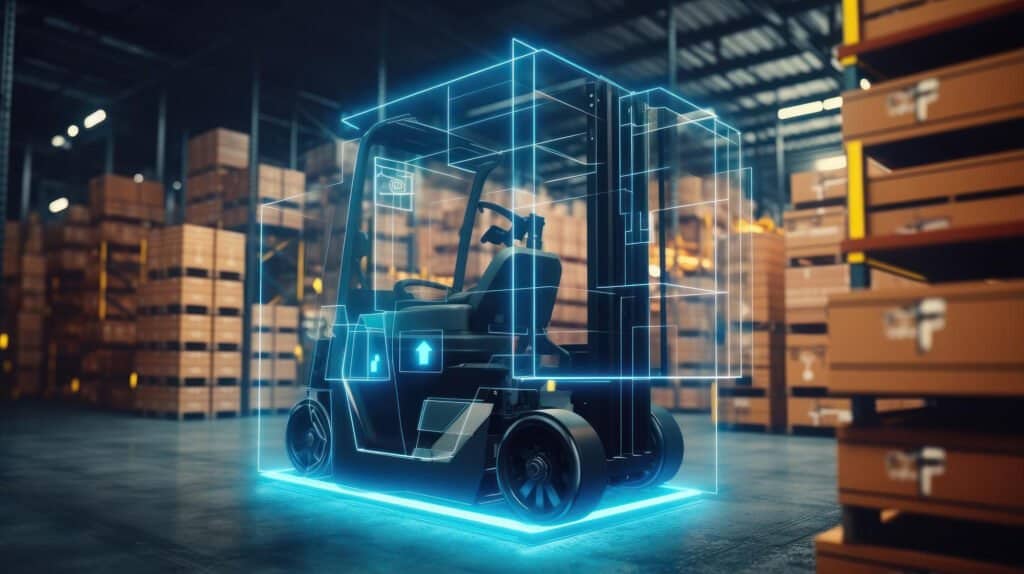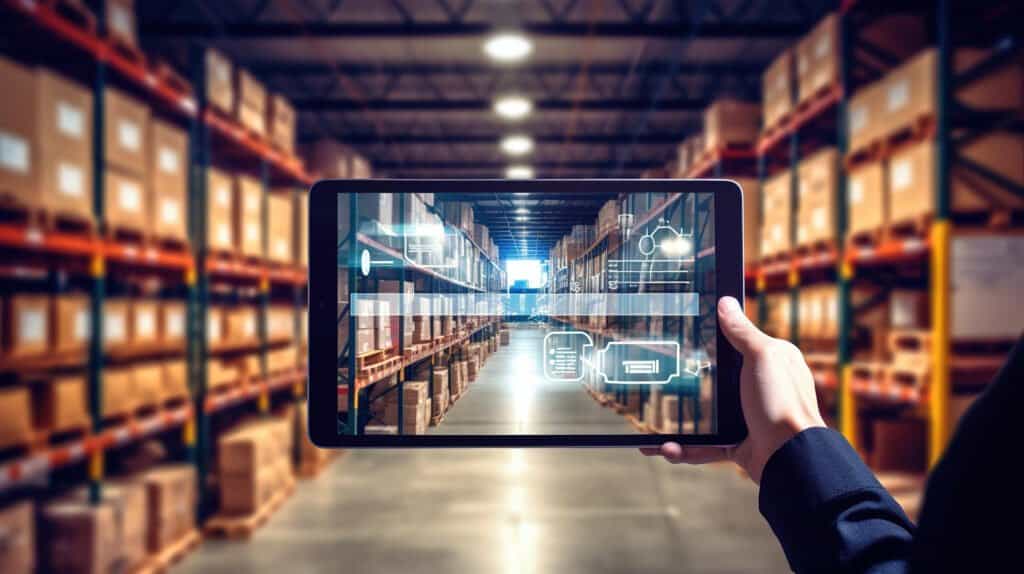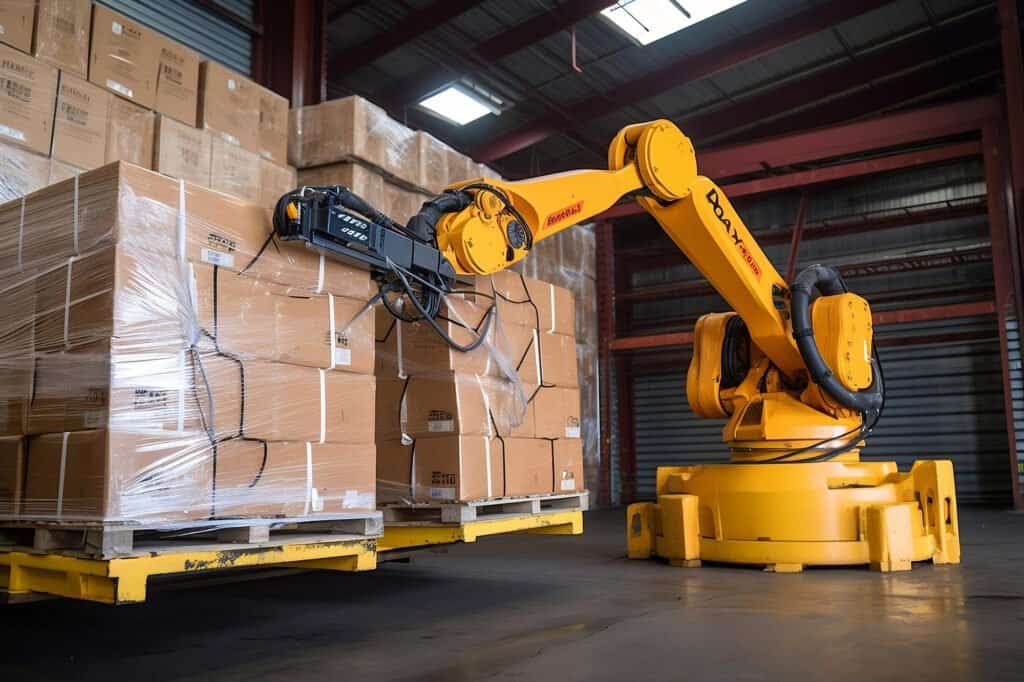The logistics and supply chain industry is undergoing a major transformation with the advent of artificial intelligence (AI). The integration of AI technologies is bringing automation, predictive analytics, and optimization to streamline operations and improve efficiency. Embracing AI-powered solutions has become essential for businesses to thrive in the modern digital world.

As organizations strive to optimize their processes, the use of AI in the supply chain is expected to witness substantial growth in the coming years. According to Gartner, supply chain organizations are anticipating a doubling of machine automation in the next five years. Furthermore, global spending on Industrial Internet of Things (IIoT) platforms is predicted to grow at a compound annual growth rate (CAGR) of 40% from 2018 to 2024.
AI-driven technologies offer numerous benefits throughout the supply chain. From improving inventory management and enhancing warehouse operations to increasing operational speed and accuracy, AI is revolutionizing the way businesses operate. By leveraging AI, organizations can achieve efficient supply chain management, reduced costs, and improved customer satisfaction.
Key Takeaways:
- AI in logistics and supply chain provides automation, predictive analytics, and optimization.
- Gartner projects a doubling of machine automation in the supply chain in the next five years.
- Global spending on IIoT platforms is expected to grow at a CAGR of 40%.
- AI improves inventory management, warehouse operations, and operational speed and accuracy.
- Organizations can achieve efficient supply chain management, reduced costs, and improved customer satisfaction with AI-powered solutions.
Improving Inventory Management with AI In Logistics
Accurate inventory management is a critical challenge in the supply chain. To address this challenge, businesses can leverage AI-driven supply chain planning processes and tools. These intelligent systems analyze and interpret vast datasets to provide timely guidance on forecasting supply and demand. By utilizing AI in inventory management, organizations can ensure a smooth flow of items in and out of their warehouses, prevent unexpected stock-outs, and optimize inventory levels.
AI-driven supply chain planning offers several benefits that help businesses overcome inventory management challenges. These benefits include:
- Mass data analysis: AI systems have the capability to handle large volumes of data. By analyzing this data, they can anticipate future customer demand trends and make accurate predictions for inventory planning.
- Cost reduction: AI-driven supply chain planning minimizes the costs of overstocking or inadequate stocking. By maintaining optimal inventory levels, organizations can reduce unnecessary expenses.
- Improved forecasting: AI algorithms can provide accurate forecasts for supply and demand, allowing businesses to make informed decisions and avoid inventory shortages or excesses.
By incorporating AI in inventory management, businesses can achieve efficient warehouse operations, reduce costs, and enhance customer satisfaction. With the optimization capabilities of AI-driven supply chain planning, organizations can meet customer demands effectively, minimize inventory holding costs, and improve overall supply chain performance.
| Benefits of AI in Inventory Management |
|---|
| Mass data analysis |
| Cost reduction |
| Improved forecasting |
Enhancing Warehouse Operations with AI Automation
Warehouse operations play a crucial role in the supply chain. By leveraging the power of artificial intelligence (AI), businesses can enhance efficiency and accuracy in these operations, leading to improved overall productivity and customer satisfaction.
AI-Based Tools for Efficient Warehouse Management
AI-based tools provide innovative solutions for efficient warehouse management. These tools can automate various processes such as item retrieval, picking, packing, and inventory management.

Through advanced algorithms, AI systems can solve warehouse issues more quickly and accurately than humans. They can simplify complex procedures, optimize workflows, and reduce the need for manual labor.
Impacts on Worker and Material Safety
Worker and material safety is a top priority in warehouse operations. AI-based automation plays a crucial role in ensuring a secure and compliant warehouse environment.
AI can analyze workplace safety data and identify potential risks or hazards. By recording stocking parameters and analyzing historical data, AI can proactively inform manufacturers about any possible risks, allowing them to take preventive measures and maintain a safe working environment.
Benefits of AI-Based Warehouse Automation
The implementation of AI-based tools in warehouse operations offers several key benefits:
- Improved Efficiency: AI automation streamlines warehouse processes, leading to faster order fulfillment and reduced cycle times.
- Enhanced Accuracy: AI systems minimize errors in tasks such as inventory management, picking, and packing, ensuring accurate order fulfillment and reducing the risk of customer dissatisfaction.
- Optimized Resource Utilization: AI tools analyze data to optimize resource allocation, such as determining the most efficient routes for order picking and minimizing unnecessary movements.
- Cost Savings: By reducing manual labor requirements and optimizing resource utilization, AI-based warehouse automation can lead to significant cost savings for businesses.
Overall, AI automation improves warehouse operations, resulting in efficient processes, enhanced worker and material safety, and cost savings for businesses.
Implementing AI-based tools in warehouse management enables organizations to stay competitive in the rapidly evolving logistics and supply chain industry.
| Benefits of AI-Based Warehouse Automation | Key Features |
|---|---|
| Improved Efficiency | Faster order fulfillment, reduced cycle times |
| Enhanced Accuracy | Minimized errors in inventory management, picking, and packing |
| Optimized Resource Utilization | Determining efficient routes for order picking, minimizing unnecessary movements |
| Cost Savings | Reduced manual labor requirements, optimized resource allocation |
By embracing AI-based warehouse automation, businesses can achieve efficient operations, improve customer satisfaction, and gain a competitive edge in the market.
Increasing Operational Speed and Accuracy with AI
Artificial intelligence (AI) has revolutionized the logistics and supply chain industry, providing organizations with the tools to enhance operational speed and accuracy. By implementing AI-powered systems, businesses can achieve greater efficiency, reduce errors, and ultimately drive down operational costs.
Automated Intelligent Operations
One of the key advantages of AI in logistics and supply chain management is the ability to automate intelligent operations. These systems can work error-free for extended durations, significantly reducing human oversight-led errors and workplace incidents. By minimizing manual intervention, organizations can streamline processes and ensure consistent, reliable performance.
Warehouse Robots
Warehouse robots, equipped with AI technology, play a vital role in improving operational speed and accuracy. These intelligent machines can efficiently perform tasks such as picking, packing, and sorting with greater precision and speed compared to human workers. By leveraging AI-powered warehouse robots, businesses can enhance productivity and meet the demands of a fast-paced supply chain.
| Benefits of Warehouse Robots | Operational Speed | Operational Accuracy | Reduced Operational Costs |
|---|---|---|---|
| High-speed task execution | Ensures minimal errors | Minimizes resource wastage | |
| Efficient order fulfillment | Optimizes inventory accuracy | Reduces labor costs | |
| 24/7 operation capabilities | Enhances product traceability | Increases overall efficiency |
These advancements in operational speed and accuracy result in reduced operational costs, leading to improved overall supply chain performance. By leveraging AI to enhance productivity and minimize errors, businesses can optimize their operations and stay ahead in today’s competitive market.

Overcoming Challenges in Implementing AI in Supply Chain
While the potential of AI in supply chain and logistics is undisputed, organizations may face several challenges when implementing AI solutions. These challenges include:
- Need for AI-Specific Hardware
- Personnel Training
- Operational Investment
- Data Management
AI-Specific Hardware: Implementing AI in the supply chain often requires specialized hardware to support the computing power and processing capabilities necessary for AI algorithms. This can involve significant initial investments, as organizations need to acquire AI-friendly infrastructure and technologies.
Personnel Training: To effectively utilize AI technologies, personnel training is crucial. Employees must be proficient in using AI tools and platforms to maximize their potential benefits. This training requires investment in terms of both time and money, as organizations need to allocate resources for training programs and workshops.
Operational Investment: While AI technology may offer long-term cost savings, there are upfront operational investments to consider. This includes the maintenance and replacement costs associated with AI-operated machines. Organizations need to allocate resources to ensure smooth operations and minimize downtime.
Data Management: Harnessing the power of AI in the supply chain relies heavily on effective data management practices. Organizations need to collect, organize, and analyze vast amounts of data to train AI algorithms and make accurate predictions. Data management challenges include ensuring data integrity, maintaining data quality, and addressing scalability concerns.
Challenges in Implementing AI in the Supply Chain:
| Challenge | Description |
|---|---|
| AI-Specific Hardware | Investment in specialized hardware for AI algorithms and processing |
| Personnel Training | Investment in training programs to ensure effective use of AI technologies |
| Operational Investment | Costs associated with maintenance and replacement of AI-operated machines |
| Data Management | Challenges in collecting, organizing, and analyzing large amounts of data |
The Role of AI in Predictive Analytics and Decision Making
Artificial Intelligence (AI) plays a crucial role in the supply chain by enabling predictive analytics and informed decision making. Through the analysis of vast datasets, AI algorithms can accurately predict demand patterns, identify potential disruptions, and optimize inventory levels. This empowers organizations to make data-driven decisions about production volumes, inventory management, and distribution strategies, ultimately enhancing overall operational efficiency and reducing costs.
By leveraging AI-driven solutions, businesses gain real-time visibility into their entire supply chain. This visibility allows for the tracking of shipments, monitoring of inventory levels, and quick responses to unforeseen challenges. With AI’s powerful capabilities in predictive analytics and decision making, supply chain managers can achieve better resource allocation, improved order fulfillment, and enhanced customer satisfaction.
One of the key advantages of AI in predictive analytics is its ability to analyze and interpret vast amounts of data, both structured and unstructured. This allows organizations to gain valuable insights into customer behavior, market trends, and operational inefficiencies. By harnessing these insights, businesses can optimize their supply chain processes, identify new sales opportunities, and proactively address potential risks.
In addition to predictive analytics, AI-driven solutions also offer advanced decision-making capabilities. AI algorithms can evaluate multiple factors and variables simultaneously, allowing businesses to make faster and more accurate decisions. With real-time data and AI-driven recommendations, organizations can respond swiftly to supply chain disruptions, adjust inventory levels accordingly, and implement efficient contingency plans.
Benefits of AI in Predictive Analytics and Decision Making:
- Accurate demand forecasting to optimize inventory levels and avoid stockouts
- Identification of potential disruptions and proactive risk management
- Real-time visibility into the supply chain, enabling timely responses to challenges
- Enhanced operational efficiency and reduced costs
- Improved customer satisfaction through optimized order fulfillment
In conclusion, AI’s role in predictive analytics and decision making is instrumental in driving efficiency and competitiveness in the supply chain. By leveraging AI-driven solutions, businesses can gain valuable insights, optimize their operations, and deliver exceptional customer experiences.
Techniques Employed in AI-Driven Logistics
AI-driven logistics solutions utilize various techniques to enhance efficiency and optimize processes. These techniques encompass:
- Machine Learning: By analyzing large datasets, machine learning algorithms identify patterns and make accurate predictions. This enables tasks such as demand forecasting and anomaly detection in the supply chain.
- Natural Language Processing: Communication between humans and machines is streamlined through natural language processing. This technique facilitates processes like chatbots and text analysis, improving overall efficiency.
- Computer Vision: Object recognition in warehouses and autonomous vehicles for transportation are made possible through computer vision. This technology ensures smooth operations and optimized logistics.
- Robotics and Automation: In warehouse operations, AI-powered robots handle tasks like picking, packing, and sorting. These robots improve productivity, accuracy, and overall warehouse efficiency.

Incorporating these AI techniques revolutionizes the logistics and supply chain industry by automating processes, maximizing accuracy, and optimizing operational efficiencies.
| Technique | Application |
|---|---|
| Machine Learning | Demand forecasting, anomaly detection |
| Natural Language Processing | Chatbots, text analysis |
| Computer Vision | Object recognition, autonomous vehicles |
| Robotics and Automation | Picking, packing, sorting |
Conclusion
The integration of AI in logistics and supply chain management is revolutionizing the industry, delivering significant benefits to businesses worldwide. With advanced technologies such as automation, predictive analytics, and route optimization, AI-powered solutions are enhancing operational efficiency, reducing costs, and elevating customer satisfaction levels. As AI continues to advance, the future of the supply chain holds even more promising advancements. From the use of autonomous vehicles and drones for last-mile deliveries to blockchain integration for enhanced security and transparency, and the implementation of edge computing for faster decision-making, the potential for AI in the supply chain is vast.
By embracing AI in logistics and supply chain operations, organizations can position themselves at the forefront of the ever-evolving global marketplace. The benefits of AI in the supply chain are far-reaching, enabling businesses to streamline processes, improve supply chain visibility, and make data-driven decisions. Increased automation and predictive analytics lead to faster and more accurate order fulfillment, reduced inventory holding costs, and optimized transportation routes.
The future of AI in the supply chain holds immense potential for businesses. Embracing AI advancements can unlock new opportunities for growth, innovation, and competitive advantage. By investing in AI technologies and leveraging their capabilities, organizations can stay ahead in the rapidly transforming landscape of logistics and supply chain management. As AI continues to reshape the industry, businesses that adopt AI-powered solutions will undoubtedly reap the benefits of improved efficiency, reduced costs, and enhanced customer satisfaction.
FAQ
How can AI improve inventory management in the supply chain?
AI-driven supply chain planning processes and tools can analyze large datasets to provide timely guidance on forecasting supply and demand, ensuring the right flow of items and optimizing inventory levels.
What are the benefits of AI automation in warehouse operations?
AI-based automation improves warehouse efficiency and accuracy by simplifying complex procedures, reducing the need for manual labor, and enhancing worker and material safety.
How does AI contribute to increased operational speed and accuracy in the supply chain?
AI-powered warehouse robots achieve higher levels of productivity by providing greater speed and accuracy in tasks like picking, packing, and sorting, resulting in reduced operational costs.
What challenges may organizations face when implementing AI in the supply chain?
Challenges include the need for specialized AI-specific hardware, personnel training, operational investments, and addressing data management and scalability issues.
What role does AI play in predictive analytics and decision making?
AI algorithms analyze vast datasets to accurately predict demand patterns, identify potential disruptions, optimize inventory levels, and provide real-time supply chain visibility for informed decision making.
What techniques are employed in AI-driven logistics?
AI techniques such as machine learning, natural language processing, computer vision, and robotics and automation are used to enhance efficiency, optimize processes, and improve productivity in logistics operations.
What is the future of AI in the supply chain?
The future of AI in the supply chain holds promising prospects, including autonomous vehicles and drones for last-mile deliveries, blockchain integration for enhanced security and transparency, and edge computing for faster decision-making.
Stay tuned for more Blog Wonders at Geek Galaxy



